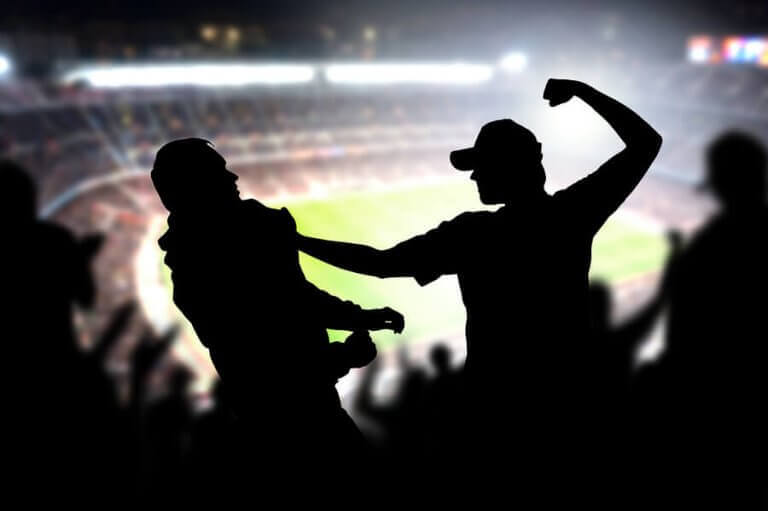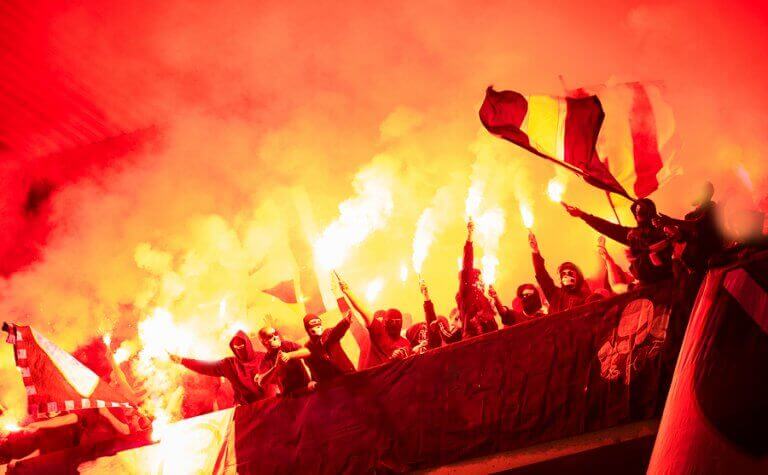Sanctions Against Fans in Sport Venues

In recent years, sports laws have been reinforcing sanctions against fans in sports venues. The non-stop acts of violence during soccer matches have highlighted the need to adopt effective measures to combat and prevent dangerous and discriminatory behavior in sports.
The RFEF and the sanctions against soccer fans
At the beginning of 2015, the Royal Spanish Soccer Federation had to review its regulations. This happened after a season of regrettable violent events on Spanish soccer fields. For this reason, they made changes regarding the acceptable and punishable behaviors of fans in sports venues.
The reformations of the General Regulations and Disciplinary Code of the RFEF have made it possible to provide stricter sanctions for clubs that participate in the different competitions of Spanish soccer.
The evolution has reinforced the institution’s responsibility for the sporting venues they own. This includes the appropriate safety measures to control possible acts of violence among fans.
However, the most relevant contribution was to regulate the creation of the Safety, Respect and Tolerance Commission. The RFEF also promoted the development of a specialized body dedicated exclusively to fight against violence in soccer.
Conduct in sports venues that lead to sanctions against fans
Modifications to the RFEF Disciplinary Code have also made it possible to broaden and update the old conception of violence in sports. Hence, the fight against violence in sports now also includes fighting and all kinds of acts that promote or encourage discrimination, racism, xenophobia, and religious intolerance.

Below, we’ll summarize six behaviors of fans in sports venues that can now receive a sanction:
1. Infringing upon the Spanish anthem or flag
Acts of violence against Spanish symbols can’t happen inside sports venues. This means that burning the Spanish flag, among other violent attitudes, is now punishable.
2. Consuming alcoholic beverages
According to article 67.3 of the Sports Law in Spain (Law 10/1990), the introduction, sale, and consumption of alcoholic beverages in sports venues during competitions is prohibited, mainly in soccer games.
Logically, the goal of this prohibition is to prevent people from getting drunk and causing accidents or committing violent acts. Fans can also receive a sanction for showing obvious sings of drunkenness during or at the entrance of sporting events.
3. Refusing to be recorded at the entrance of competitions
Article 22.1b of Law 19/2007 against violence, racism, xenophobia, and intolerance in sports, states that fans will receive a sanction for refusing to be recorded or registered at the entrance of sports venues.
In these cases, the individuals can receive punishment and a ban from accessing the sporting event. The economic sanctions can vary between €3,000 to €650,000 since it’s a very serious offense.
4. Making insults in sport venues
In accordance with article 22.1c of the same law, the act of making insults in sports venues is also punishable. It doesn’t matter if they target other fans, athletes, members of the arbitration or the technical body, or any worker who is performing their functions in that ambit.
5. Carry symbols that encourage violence or intolerance
To prevent acts of violence during competitions, fans can’t enter sports venues with symbols that encourage any form of discrimination and intolerance. This, of course, includes flags and banners. But it also includes all emblems that hold links to terrorism, xenophobia or racist initiatives.

This point has caused a great deal of controversy among fans after the attempt to ban the entry to sports venues while carrying The Estelada. According to some authorities, the symbol of the fight for the independence of Catalonia could encourage violent acts due to the political differences between fans.
6. Carry dangerous objects or fireworks in sports venues: an obvious behavior that causes sanctions against fans
Lastly, fans can’t enter sport venues while carrying fireworks or potentially dangerous objects. This, of course, includes scissors, pocket knives, metal-tipped umbrellas, firearms, and bottles, among others.
They also can’t access sports competitions with objects that exceed 500 grams of weight. This is also a serious offense and can lead to financial penalties of up to €4,000 and a ban on attending any sporting venue for 12 months.
In recent years, sports laws have been reinforcing sanctions against fans in sports venues. The non-stop acts of violence during soccer matches have highlighted the need to adopt effective measures to combat and prevent dangerous and discriminatory behavior in sports.
The RFEF and the sanctions against soccer fans
At the beginning of 2015, the Royal Spanish Soccer Federation had to review its regulations. This happened after a season of regrettable violent events on Spanish soccer fields. For this reason, they made changes regarding the acceptable and punishable behaviors of fans in sports venues.
The reformations of the General Regulations and Disciplinary Code of the RFEF have made it possible to provide stricter sanctions for clubs that participate in the different competitions of Spanish soccer.
The evolution has reinforced the institution’s responsibility for the sporting venues they own. This includes the appropriate safety measures to control possible acts of violence among fans.
However, the most relevant contribution was to regulate the creation of the Safety, Respect and Tolerance Commission. The RFEF also promoted the development of a specialized body dedicated exclusively to fight against violence in soccer.
Conduct in sports venues that lead to sanctions against fans
Modifications to the RFEF Disciplinary Code have also made it possible to broaden and update the old conception of violence in sports. Hence, the fight against violence in sports now also includes fighting and all kinds of acts that promote or encourage discrimination, racism, xenophobia, and religious intolerance.

Below, we’ll summarize six behaviors of fans in sports venues that can now receive a sanction:
1. Infringing upon the Spanish anthem or flag
Acts of violence against Spanish symbols can’t happen inside sports venues. This means that burning the Spanish flag, among other violent attitudes, is now punishable.
2. Consuming alcoholic beverages
According to article 67.3 of the Sports Law in Spain (Law 10/1990), the introduction, sale, and consumption of alcoholic beverages in sports venues during competitions is prohibited, mainly in soccer games.
Logically, the goal of this prohibition is to prevent people from getting drunk and causing accidents or committing violent acts. Fans can also receive a sanction for showing obvious sings of drunkenness during or at the entrance of sporting events.
3. Refusing to be recorded at the entrance of competitions
Article 22.1b of Law 19/2007 against violence, racism, xenophobia, and intolerance in sports, states that fans will receive a sanction for refusing to be recorded or registered at the entrance of sports venues.
In these cases, the individuals can receive punishment and a ban from accessing the sporting event. The economic sanctions can vary between €3,000 to €650,000 since it’s a very serious offense.
4. Making insults in sport venues
In accordance with article 22.1c of the same law, the act of making insults in sports venues is also punishable. It doesn’t matter if they target other fans, athletes, members of the arbitration or the technical body, or any worker who is performing their functions in that ambit.
5. Carry symbols that encourage violence or intolerance
To prevent acts of violence during competitions, fans can’t enter sports venues with symbols that encourage any form of discrimination and intolerance. This, of course, includes flags and banners. But it also includes all emblems that hold links to terrorism, xenophobia or racist initiatives.

This point has caused a great deal of controversy among fans after the attempt to ban the entry to sports venues while carrying The Estelada. According to some authorities, the symbol of the fight for the independence of Catalonia could encourage violent acts due to the political differences between fans.
6. Carry dangerous objects or fireworks in sports venues: an obvious behavior that causes sanctions against fans
Lastly, fans can’t enter sport venues while carrying fireworks or potentially dangerous objects. This, of course, includes scissors, pocket knives, metal-tipped umbrellas, firearms, and bottles, among others.
They also can’t access sports competitions with objects that exceed 500 grams of weight. This is also a serious offense and can lead to financial penalties of up to €4,000 and a ban on attending any sporting venue for 12 months.
All cited sources were thoroughly reviewed by our team to ensure their quality, reliability, currency, and validity. The bibliography of this article was considered reliable and of academic or scientific accuracy.
- Ley 19/2007, de 11 de julio, contra la violencia, el racismo, la xenofobia y la intolerancia en el deporte. Extraído de: https://www.boe.es/buscar/doc.php?id=BOE-A-2007-13408
- Ley 10/1990, de 15 de octubre, del Deporte. Extraído de: https://www.boe.es/buscar/pdf/1990/BOE-A-1990-25037-consolidado.pdf
This text is provided for informational purposes only and does not replace consultation with a professional. If in doubt, consult your specialist.








